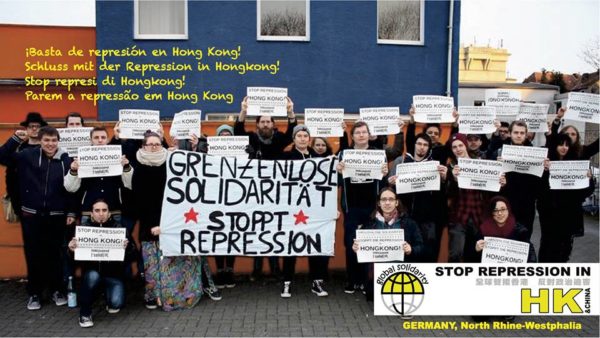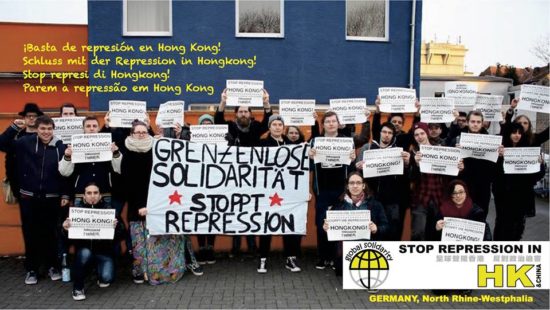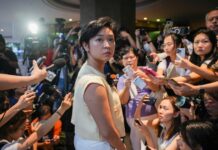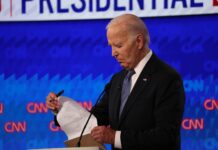Noam Chomsky among signatories of worldwide petition launched by Stop Repression in Hong Kong campaign
Vincent Kolo
The Stop Repression in Hong Kong campaign is planning a day of worldwide protests on Friday 4 May. chinaworker.info urges readers around the world to participate in the protests against increasing political repression in Hong Kong and China. More information and campaign material can be found on the campaign’s website stophkrepression.net.
The Stop Repression in Hong Kong campaign was launched last October with protests in 22 cities around the world. It explicitly targets support from left activists and workers’ organisations, explaining that capitalist politicians and the right are too enamoured by economic links with the Chinese regime and conflicted by their own undemocratic policies to offer real support for democratic rights in Hong Kong or China. Donald Trump’s response when China’s leader Xi Jinping changed the rules allowing him to rule for life, was to praise Xi and tell a public rally, “Maybe we’ll give that a shot someday!”
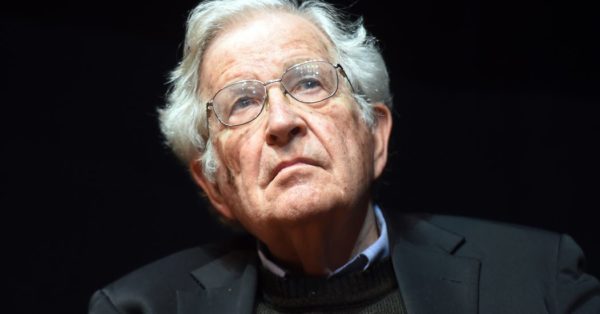
Noam Chomsky and Danish Red-Green Alliance
The campaign’s petition is gaining signatures worldwide. New signatories include writer and social activist Noam Chomsky, human rights activist Peter Dahlin (arrested on trumped up charges and deported from China in 2016), and Søren Søndergaard, member of parliament and foreign affairs spokesperson for the Red-Green Alliance in the Danish parliament. MPs in Ireland and Germany have also signed the petition, as have prominent trade unionists in Brazil, Britain and South Africa.
The international protest in May is to oppose election manipulation in Hong Kong, the banning of pro-democracy candidates and parties from contesting elections, disqualification of elected members of Hong Kong’s partially elected legislature (Legco), and new repressive laws aimed to enforce obedience to China’s so-called Communist dictatorship (CCP).
Protests against Xi
It is also to show solidarity with unexpectedly bold protests inside China, and by overseas Chinese, against Xi Jinping’s rule changes, which shift the praxis of the Chinese regime from “one-party” to “one-man” dictatorship.
There has been a spate of fly posting by overseas Chinese students at campuses in Canada, the United States, Australia and Britain around the themes ‘Not my president’ and ‘Stop Xi Jinping’. This has been carried out at night or using facemasks to avoid repercussions when these students go home to China. Inside China, despite massive online censorship and the banning of more than 30 search terms on social media (from “constitutional amendment” to “my emperor” to “1984”), there has been a surge in critical posts opposing Xi’s accumulation of power. The scale of this political backlash has taken the regime by surprise.
Xi, who cemented his dominance over the state at last year’s 19th CCP Congress, started his second term as president on 17 March, with China’s pseudo parliament, the NPC, rubber-stamping his appointment by 2,970 votes for and none against. This degree of control has been achieved via a ruthless intra-regime power struggle and purge waged under the mantle of “anti-corruption”, alongside increased state repression, an unprecedented media campaign and personality cult, and increasingly nationalist foreign and military policies.
Among the NPC ‘delegates’ who unanimously endorsed Xi (not even Mao Zedong boasted such convincing ‘election’ results), were 45 billionaires. The ranks of China’s super-rich have more than tripled since Xi took power in 2012 (251 dollar billionaires then, 819 now), while repression against regime critics is now “the worst since the [1989] Tiananmen crackdown” according to Amnesty International. It is highly likely this repression will intensify as Xi extends his rule.
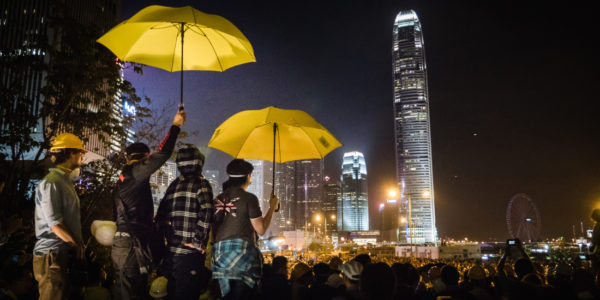
Hong Kong crackdown
In Hong Kong, ruled by China since 1997, repression against the democracy movement follows a more ‘legal’ road, using the government’s control of the media and law courts, and a Legco in which the pan-democratic (pro-democracy) opposition has been downsized and intimidated by purges, election manipulation and new undemocratic rules.
More than 40 court cases are pending against prominent activists from the Umbrella Movement, a mass democracy movement that occupied Hong Kong streets for more than eleven weeks in 2014. Some of these court cases involve charges that have never existed before, including “inciting others to incite(!!) a public nuisance”, charges that could carry a total of 21 years in prison if the defendants are found guilty. In 2017, Hong Kong got its first political prisoners in modern times when 16 young activists were jailed for up to 13 months accused of “unlawful assembly”.
A new national anthem law is imminent, which will carry a three-year prison term for Hong Kong citizens who “disrespect” China’s national anthem. Draconian legislation like this will of course increase rather than diminish pro-independence and anti-China sentiment among young people. Hong Kong’s local government is still hesitating over the precise timing for introducing a tough national security law, Article 23, mindful of the volcanic opposition this triggered in 2003, the last time they tried to push it through.
Article 23
But “Emperor Xi” is pressuring them on this. Even without Article 23, Hong Kong’s democratic space is shrinking dramatically with candidates who advocate “self-determination” for Hong Kong banned from standing in recent Legco by-elections, to fill four of the six seats left vacant by last year’s government-instigated purge.
The by-elections were a setback for the pan-democratic candidates who lost one of the seats they expected to win back. This was due to a combination of government manipulation, media blackout (not a single opinion poll throughout the campaign) and a made-to-order low turnout, which benefited the pro-government parties whose campaigns are not really based on politics but on a gigantic machinery of mobilisation, patronage and vote-buying (financed by the CCP and Hong Kong’s billionaires).
But critically, there was also a significant rate of abstention, showing a reluctance among some youth and workers to support pro-democracy candidates who were seen as ‘mainstream’ and did not offer a way to fight back against the unprecedented undemocratic attacks or the government’s increased austerity and pro-rich policies that accompany it.
New attacks
The pro-Beijing camp has been on cloud nine since the by-elections in March. Their plans to move the political crackdown into a higher gear were shown in a speech by Tam Yiu-chung, a leading figure in the camp. Tam is a former leader of the pro-Beijing Democratic Alliance for the Betterment and Progress of Hong Kong (DAB) and a current Standing Committee member of China’s NPC. After the pan-democrats’ poor by-election showing, he called for even tighter political vetting of Hong Kong election candidates – banning anyone who calls for an end to “one-party dictatorship” in China.
Rather than mount a vociferous counter campaign; the most visible response from the pan-democratic parties has been fear – that they can lose their seats or be disqualified from standing in future elections. The Stop Repression in Hong Kong campaign is emphasising that only mass resistance can defeat repression. This is the lesson from countless international struggles against despotic regimes.
The beginnings of a protest consciousness among mainland Chinese youth as shown by the anti-Xi posters and twitter campaign are extremely important as a sign of change, and an opening for building a united struggle against authoritarian rule in China and Hong Kong.
May 4 is a historic day in China, the anniversary of the first major student movement in 1919 for democracy, against imperialism, and rejecting a conservative ruling establishment that had betrayed the hopes of the 1911 anti-dynastic revolution. The ‘May Fourth’ movement was also the beginning of independent political action by China’s working class.
For campaign material, placards and leaflets to organise protest activities on 4 May, and for more information visit stophkrepression.net
Sign the online petition here.
